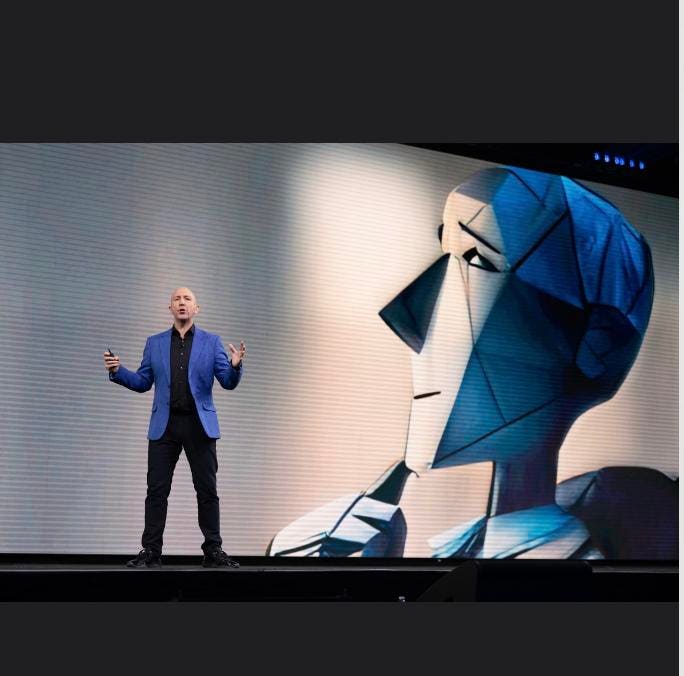From Chatbots To Workbots: Why NiCE’s AI Strategy Focuses On Execution
In 2025, enterprise AI is evolving towards digital workers that can perform tasks. NICE has introduced Agentic AI and formed partnerships with AWS, ServiceNow, and Snowflake. This shift indicates a move beyond simple chatbots to more advanced AI capabilities. The integration of AI into various platforms is expected to streamline operations and enhance efficiency. These developments suggest a growing emphasis on automation and intelligent decision-making in the business world.

NiCE's Strategic Bet on Agentic AI in the Enterprise
NiCE is betting that AI agents that complete tasks—not just conversations—will separate winners from pretenders in the enterprise AI race. The artificial intelligence hype cycle has reached peak saturation, with technology vendors scrambling to slap "AI-powered" labels on everything from refrigerator recipe suggestions to chatbots that rely on simple keyword matching. Yet, for all the breathless marketing rhetoric, most business leaders are still waiting for AI that simplifies operations and improves data analysis.
NiCE, a customer experience platform provider, is making a calculated bet that the next phase of enterprise AI won’t be about making chatbots sound more human. The next wave of business outcomes will leverage AI agents that can navigate complex business processes from start to finish with minimal human intervention. NiCE’s CEO, Scott Russell said, “Optimizing knowledge is not just critical for AI to truly thrive in your environment, but it’s also the key for transforming service from reactive to proactive, identifying opportunities to solve issues and predict future needs.”
NiCE's Move to Agentic AI
NiCE’s recent product launches and strategic moves reveal a move toward enhanced automation and agentic AI. The first wave of enterprise AI focused primarily on making data more accessible through conversational interfaces—essentially putting a chat layer on top of existing applications and knowledge repositories. While this represented significant progress in democratizing data access, it only scratched the surface of AI's potential business value. Organizations could ask questions and get answers, but the burden of reasoning through complex decisions and taking action remained entirely on human operators.
Going forward, technology vendors, such as NiCE, will use AI to deliver solutions that can reason through multifaceted problems and take semi or fully autonomous action. This evolution from conversational AI to agentic AI represents the difference between AI that informs and AI that performs. Agentic AI enhances a company's ability to analyze context, weigh multiple variables, make informed decisions based on key business performance indicators, and execute actions across interconnected systems.
Strategic Partnerships and Collaborations
Today, companies are no longer looking for isolated solutions—they need interconnected ecosystems. That's why strategic partnerships are essential. By working together, enterprise technology vendors can bridge data and function silos, improving workflows and accelerating innovation. Just as importantly, these alliances help enterprises extract greater value from existing technology investments by ensuring that new capabilities work in concert with the tools already in place.
Over the past several months, NiCE has expanded its partnership with Amazon Web Services (AWS) and added ServiceNow and Snowflake to the mix. At Interactions 2025, NiCE announced an expanded collaboration with AWS, bringing together NiCE's domain expertise and rich interaction data with AWS's cloud infrastructure and generative AI services, including Amazon Bedrock, Amazon Q, and the Amazon Nova family of large language models.
Future Prospects and Impact
The enterprise AI market remains in flux, with new entrants and existing players continually repositioning themselves. NiCE's focus on domain expertise, integration depth, strategic partnerships, and automation suggests a company that understands both the technical and implementation requirements necessary for large-scale AI adoption. As enterprises increasingly demand AI that delivers results, NiCE’s bet on fulfillment-focused automation may prove prescient.
Of course, there’s still the matter of cost and return on investment. Most companies struggle to understand and plan for the true product and operational costs of AI. Organizations need to work with their technology vendors to deploy well-scoped use cases that deliver measurable return on investment, fast. The question isn't whether AI will transform customer experience—it's which companies will build AI that completes the transformation rather than just talking about it.

